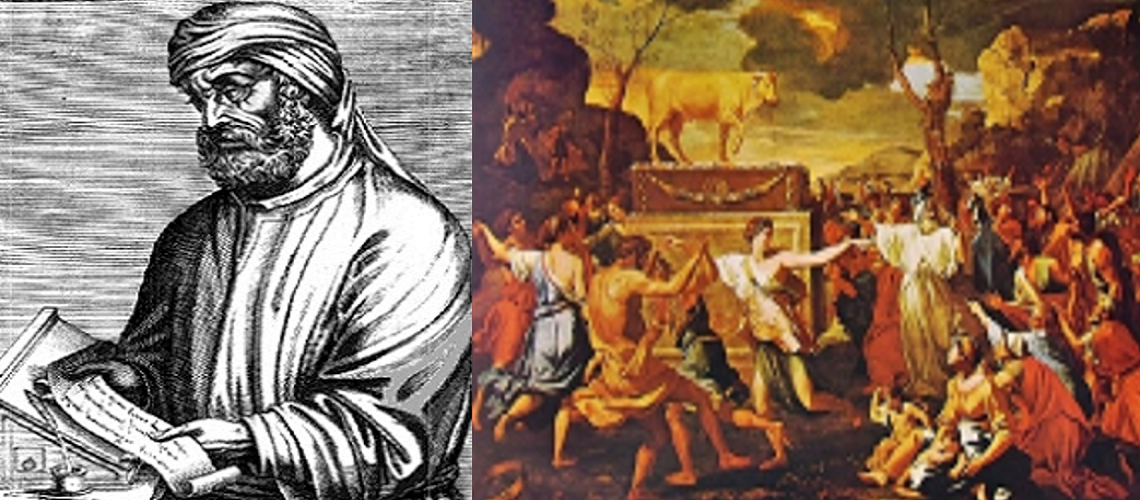The principal crime of the human race, the highest guilt charged upon the world, the whole procuring cause of judgment, is idolatry. For, although each single fault retains its own proper feature, although it is destined to judgment under its own proper name also, yet it is marked off under the general account of idolatry. Set aside names, examine works, the idolater is likewise a murderer. Do you inquire whom he has slain? If it contributes ought to the aggravation of the indictment, no stranger nor personal enemy, but his own self. By what snares? Those of his error. By what weapon? The offence done to God. By how many blows? As many as are his idolatries. He who affirms that the idolater perishes not, will affirm that the idolater has not committed murder. Further, you may recognize in the same crime adultery and fornication; for he who serves false gods is doubtless an adulterer of truth, because all falsehood is adultery. So, too, he is sunk in fornication. For who that is a fellow-worker with unclean spirits, does not stalk in general pollution and fornication? And thus it is that the Holy Scriptures use the designation of fornication in their upbraiding of idolatry.
The essence of fraud, I take it, is, that any should seize what is another’s, or refuse to another his due; and, of course, fraud done toward man is a name of greatest crime. Well, but idolatry does fraud to God, by refusing to Him, and conferring on others, His honors; so that to fraud it also conjoins contumely. But if fraud, just as much as fornication and adultery, entails death, then, in these cases, equally with the former, idolatry stands unacquitted of the impeachment of murder. After such crimes, so pernicious, so devouring of salvation, all other crimes also, after some manner, and separately disposed in order, find their own essence represented in idolatry. In it also are the concupiscences of the world. For what solemnity of idolatry is without the circumstance of dress and ornament? In it are lasciviousnesses and drunkennesses; since it is, for the most part, for the sake of food, and stomach, and appetite, that these solemnities are frequented. In it is unrighteousness. For what more unrighteous than it, which knows not the Father of righteousness? In it also is vanity, since its whole system is vain. In it is mendacity, for its whole substance is false. Thus it comes to pass, that in idolatry all crimes are detected, and in all crimes idolatry. Even otherwise, since all faults savour of opposition to God, and there is nothing which savours of opposition to God which is not assigned to demons and unclean spirits, whose property idols are; doubtless, whoever commits a fault is chargeable with idolatry, for he does that which pertains to the proprietors of idols.
But let the universal names of crimes withdraw to the specialties of their own works; let idolatry remain in that which it is itself. Sufficient to itself is a name so inimical to God, a substance of crime so copious, which reaches forth so many branches, diffuses so many veins, that from this name, for the greatest part, is drawn the material of all the modes in which the expansiveness of idolatry has to be fore guarded against by us, since in manifold wise it subverts the servants of God; and this not only when unperceived, but also when cloaked over. Most men simply regard idolatry as to be interpreted in these senses alone, viz.: if one burn incense, or immolate a victim, or give a sacrificial banquet, or be bound to some sacred functions or priesthoods; just as if one were to regard adultery as to be accounted in kisses, and in embraces, and in actual fleshly contact; or murder as to be reckoned only in the shedding forth of blood, and in the actual taking away of life.
But how far wider an extent the Lord assigns to those crimes we are sure: when He defines adultery to consist even in concupiscence, “if one shall have cast an eye lustfully on,” and stirred his soul with immodest commotion; when He judges murder to consist even in a word of curse or of reproach, and in every impulse of anger, and in the neglect of charity toward a brother: just as John teaches, that he who hates his brother is a murderer. Else, both the devil’s ingenuity in malice, and God the Lord’s in the Discipline by which He fortifies us against the devil’s depths, would have but limited scope, if we were judged only in such faults as even the heathen nations have decreed punishable. How will our “righteousness abound above that of the Scribes and Pharisees,” as the Lord has prescribed, unless we shall have seen through the abundance of that adversary quality, that is, of unrighteousness? But if the head of unrighteousness is idolatry, the first point is, that we be fore-fortified against the abundance of idolatry, while we recognize it not only in its palpable manifestations.
References
Tertullian. (1885). On Idolatry. In A. Roberts, J. Donaldson, & A. C. Coxe (Eds.), S. Thelwall (Trans.), Latin Christianity: Its Founder, Tertullian (Vol. 3, pp. 61–62). Buffalo, NY: Christian Literature Company.







